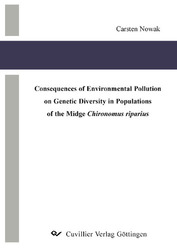| Fachbereiche | |
|---|---|
| Buchreihen (97) |
1382
|
| Nachhaltigkeit |
3
|
| Gesundheitswesen |
1
|
| Geisteswissenschaften |
2372
|
| Naturwissenschaften |
5408
|
| Mathematik | 228 |
| Informatik | 320 |
| Physik | 980 |
| Chemie | 1364 |
| Geowissenschaften | 131 |
| Humanmedizin | 243 |
| Zahn-, Mund- und Kieferheilkunde | 10 |
| Veterinärmedizin | 108 |
| Pharmazie | 147 |
| Biologie | 835 |
| Biochemie, Molekularbiologie, Gentechnologie | 121 |
| Biophysik | 25 |
| Ernährungs- und Haushaltswissenschaften | 45 |
| Land- und Agrarwissenschaften | 1005 |
| Forstwissenschaften | 201 |
| Gartenbauwissenschaft | 20 |
| Umweltforschung, Ökologie und Landespflege | 148 |
| Ingenieurwissenschaften |
1798
|
| Allgemein |
98
|
|
Leitlinien Unfallchirurgie
5. Auflage bestellen |
|
Erweiterte Suche
Consequences of Environmental Pollution on Genetic Diversity in Populations of the Midge Chironomus riparius
Carsten Nowak (Autor)Vorschau
Inhaltsverzeichnis, Datei (47 KB)
Leseprobe, Datei (89 KB)
Research in ecotoxicology has accumulated a large body of information
concerning the impact of chemical stress on life history of several
model species. In contrast, potential effects of pollutants on intraspecific
(genetic) variation in populations have rarely been investigated.
This survey assesses the effects of heavy metal exposure
on laboratory and field populations of the midge, Chironomus riparius
(Chironomidae: Diptera). Six different studies are presented in
this book, including the development of genetic markers for
Chironomus midges, a quantification of genetic erosion in TBT-exposed
Chironomus populations in the laboratory, and an investigation
of genetic population structure of two Chironomus species in the field.
These topics as well as the documentation of severe genetic impoverishment
in laboratory populations of C. riparius and its effects
on the outcome of toxicity tests will be of great interest to ecotoxicologists
and experimental ecologists.
| ISBN-13 (Printausgabe) | 3867276544 |
| ISBN-13 (Printausgabe) | 9783867276542 |
| ISBN-13 (E-Book) | 9783736926547 |
| Buchendformat | A5 |
| Sprache | Englisch |
| Seitenanzahl | 106 |
| Auflage | 1 Aufl. |
| Band | 0 |
| Erscheinungsort | Göttingen |
| Promotionsort | Frankfurt/Main |
| Erscheinungsdatum | 24.07.2008 |
| Allgemeine Einordnung | Dissertation |
| Fachbereiche |
Biologie
|








